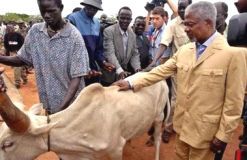Humanitarian crisis brewing as peace emerges in southern Sudan- Garng
RUMBEIK, Sudan, May 29, 2005 (AP) — U.N. Secretary-General Kofi Annan met here Sunday with an ex-rebel leader who told him that the postwar return of hundreds of thousands of refugees to their homes in southern Sudan is mushrooming into a humanitarian crisis.

|
|
UN Secretary-General Kofi Annan (R) receives the traditional gift of white bulls from chairman of Sudan People’s Liberation Movement Dr. John Garang in Rumbek, Sudan, May 29, 2005. (Reuters). |
John Garang, Chairman of the Sudan People’s Liberation Movement, told Annan that more than a quarter-million refugees have returned to homes around this former rebel stronghold since the signing of the January peace agreement with the Sudanese government in Khartoum.
Now, Garang said, the war-ravaged region needs help feeding the returnees, who have not yet been able to go back to farming.
“The U.N. food pipeline is empty,” Garang told Annan.
Annan spent about five hours in southern Sudan in the last stop on his three-day tour of Sudan before flying to Addis Ababa, Ethiopia.
He was greeted at the airport here by hundreds of colorfully dressed locals who danced and shouted greetings to the secretary-general. Farmers presented a pair of white bulls to Annan and asked the U.N. leader to lay his hands on them in a good luck gesture. Enthusiastic well-wishers lined the roads to greet Annan as his motorcade passed.
The Sudan News Agency quoted Annan as saying that his visit to Rumbeik was to show “backing for the peace process in the Sudan.”
January’s peace deal signed in Kenya made Garang a first vice president, cleared the way for the drafting of a new constitution and gave southern states the opportunity to vote on secession in six years. The SPLM also will take 30 percent of seats in a transitional national government.
The 21-year war pitted the Arab Muslim-dominated government in Khartoum against rebels fighting for greater autonomy and a larger share of the country’s wealth in the largely African animist and Christian south. Two million people are thought to have been killed in the war.
Last month, the two sides began talks aimed at drafting a new constitution, which Sudanese President Omar el-Bashir branded as the start of the most critical period in the history of Africa’s largest country.
A new Sudanese government comprising members of SPLM must be formed by July 9. But before that can happen, the six-year transitional constitution must be drawn up and ratified by the existing Sudanese parliament and the SPLM.
Many hope efforts to draw up a new constitution, which will replace the Islamic-oriented one in place since 1998, will spur attempts to reconcile warring sides in Sudan’s western Darfur region, where more than two years of conflict has killed some 180,000 people, mainly from war-induced hunger and disease, according to U.N. estimates.
